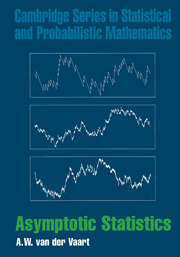Book contents
- Frontmatter
- Dedication
- Contents
- Preface
- Notation
- 1 Introduction
- 2 Stochastic Convergence
- 3 Delta Method
- 4 Moment Estimators
- 5 M–and Z-Estimators
- 6 Contiguity
- 7 Local Asymptotic Normality
- 8 Efficiency of Estimators
- 9 Limits of Experiments
- 10 Bayes Procedures
- 11 Projections
- 12 U -Statistics
- 13 Rank, Sign, and Permutation Statistics
- 14 Relative Efficiency of Tests
- 15 Efficiency of Tests
- 16 Likelihood Ratio Tests
- 17 Chi-Square Tests
- 18 Stochastic Convergence in Metric Spaces
- 19 Empirical Processes
- 20 Functional Delta Method
- 21 Quantiles and Order Statistics
- 22 L-Statistics
- 23 Bootstrap
- 24 Nonparametric Density Estimation
- 25 Semiparametric Models
- References
- Index
4 - Moment Estimators
Published online by Cambridge University Press: 05 June 2012
- Frontmatter
- Dedication
- Contents
- Preface
- Notation
- 1 Introduction
- 2 Stochastic Convergence
- 3 Delta Method
- 4 Moment Estimators
- 5 M–and Z-Estimators
- 6 Contiguity
- 7 Local Asymptotic Normality
- 8 Efficiency of Estimators
- 9 Limits of Experiments
- 10 Bayes Procedures
- 11 Projections
- 12 U -Statistics
- 13 Rank, Sign, and Permutation Statistics
- 14 Relative Efficiency of Tests
- 15 Efficiency of Tests
- 16 Likelihood Ratio Tests
- 17 Chi-Square Tests
- 18 Stochastic Convergence in Metric Spaces
- 19 Empirical Processes
- 20 Functional Delta Method
- 21 Quantiles and Order Statistics
- 22 L-Statistics
- 23 Bootstrap
- 24 Nonparametric Density Estimation
- 25 Semiparametric Models
- References
- Index
Summary
The method of moments determines estimators by comparing sample and theoretical moments. Moment estimators are useful for their simplicity, although not always optimal. Maximum likelihood estimators for full exponentialfamilies are moment estimators, and their asymptotic normality can be proved by treating them as such.
Method of Moments
Let X1, … , X n be a sample from a distribution Po that depends on a parameter ranging over some set. The method of moments consists of estimating by the solution of a system of equations
for given functions Thus the parameter is chosen such that the sample moments (on the left side) match the theoretical moments. If the parameter is k-dimensional one usually tries to match k moments in this manner. The choices lead to the method of moments in its simplest form.
Moment estimators are not necessarily the best estimators, but under reasonable conditions they have convergence rate and are asymptotically normal. This is a consequence of the delta method. Write the given functions in the vector notation and let be the vector-valued expectation Then the moment estimator solves the system of equations
For existence of the moment estimator, it is necessary that the vectorbe in the range of the function If is one-to-one, then the moment estimator is uniquely determined as
If is asymptotically normal and is differentiable, then the right side is asymptotically normal by the delta method.
The derivative of at is the inverse of the derivative of eat Because the function is often not explicit, it is convenient to ascertain its differentiability from the differentiability of This is possible by the inverse function theorem. According to this theorem a map that is (continuously) differentiable throughout an open set with nonsingular derivatives is locally one-to-one, is of full rank, and has a differentiable inverse. Thus we obtain the following theorem.
- Type
- Chapter
- Information
- Asymptotic Statistics , pp. 35 - 40Publisher: Cambridge University PressPrint publication year: 1998



